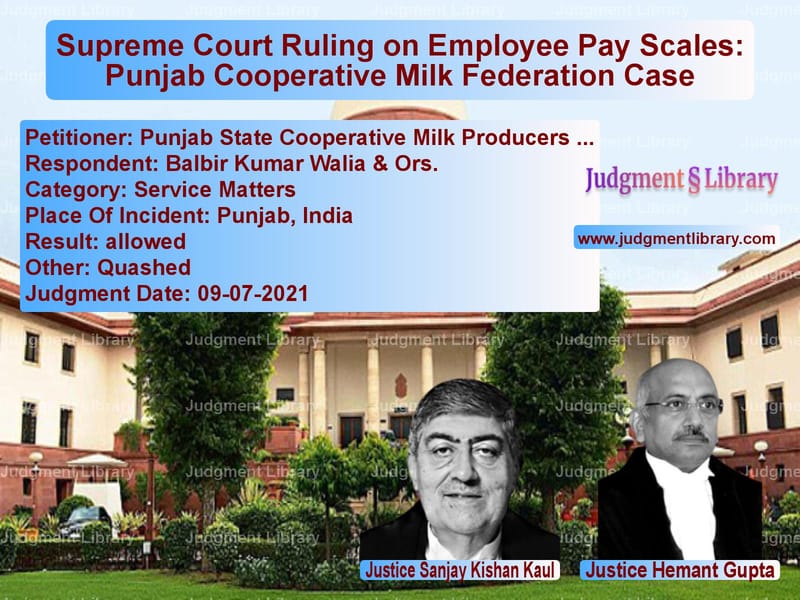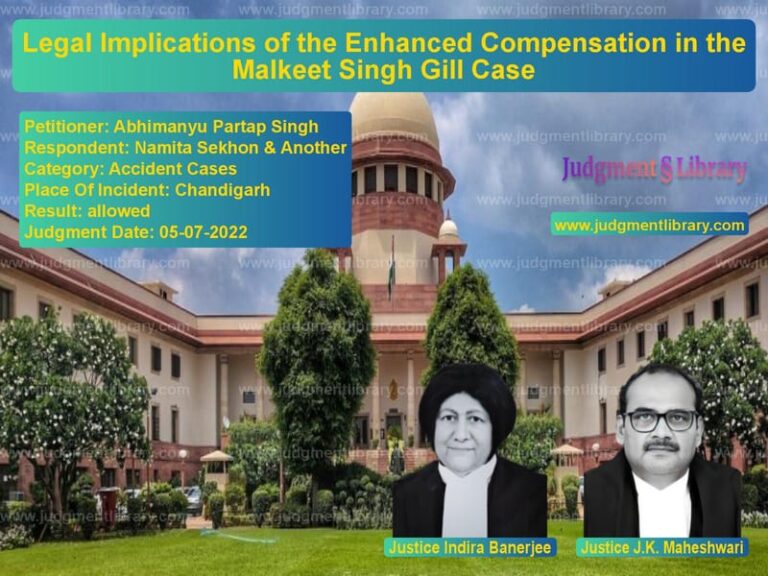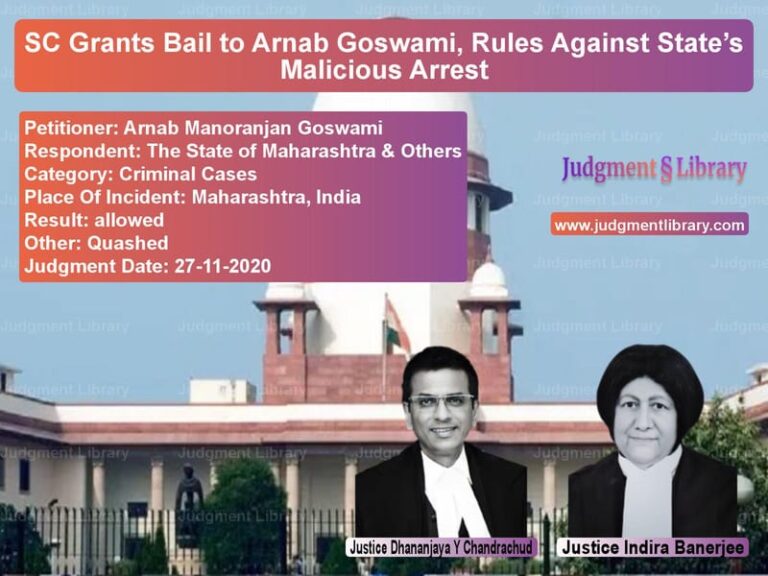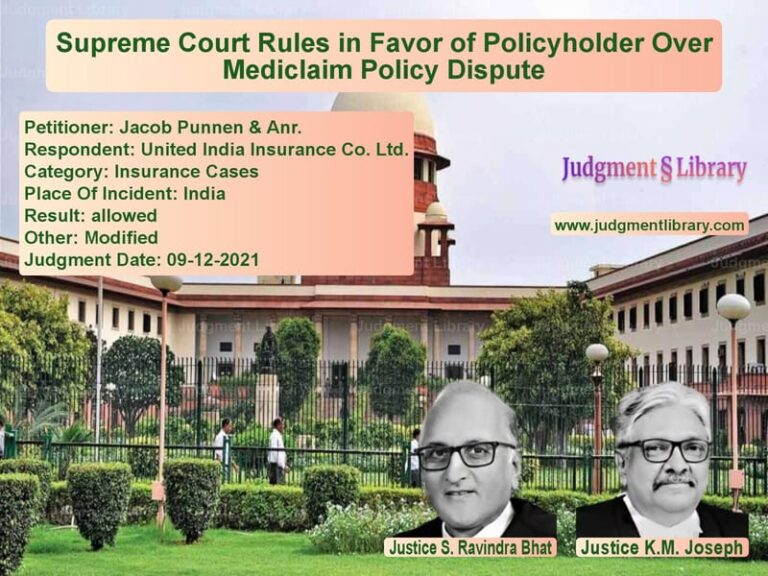Supreme Court Ruling on Employee Pay Scales: Punjab Cooperative Milk Federation Case
The Supreme Court’s judgment in Punjab State Cooperative Milk Producers Federation Ltd. & Anr. vs. Balbir Kumar Walia & Ors. has provided significant clarity on employee pay scale revisions and financial constraints faced by public sector enterprises. The case primarily revolved around whether the Federation’s employees were entitled to pay scales equivalent to their counterparts in the Punjab Government, and whether financial stringency was a valid ground to deny higher pay scales.
The Court extensively analyzed the legal and economic aspects of pay scale revision, the applicability of Article 12 of the Constitution, and the limitations of judicial review in administrative decisions regarding financial constraints.
Background of the Case
The Punjab State Cooperative Milk Producers Federation (Milkfed) is a cooperative organization engaged in dairy production and management. The dispute arose when employees of Milkfed sought revised pay scales in line with Punjab Government employees, effective from January 1, 1986. However, the Federation granted the revised pay scales only from January 1, 1994, citing severe financial constraints.
The employees approached the Punjab and Haryana High Court, which ruled in their favor, directing that they should receive revised pay scales from January 1, 1986. Aggrieved by this decision, the Federation appealed to the Supreme Court, arguing that financial difficulties prevented them from implementing the pay revision earlier.
Key Legal Issues
- Whether the Federation was bound to grant revised pay scales from January 1, 1986, despite financial constraints.
- Whether the High Court exceeded its judicial review powers by interfering with an administrative decision.
- Whether the principle of ‘equal pay for equal work’ applied to different categories of employees within the Federation.
Arguments by the Federation
The Federation, represented by senior counsel, contended:
- That it was suffering from an acute financial crisis during the relevant period, and it had taken loans from the Punjab Government and the National Dairy Development Board to sustain operations.
- That pay revisions were implemented from January 1, 1994, based on recommendations of a committee that evaluated the financial condition of the organization.
- That the High Court had ignored established precedents where financial viability was recognized as a critical factor in wage determinations.
- That granting pay revisions retrospectively would create an unsustainable financial burden.
Arguments by the Employees
The employees, represented by their legal counsel, countered:
- That the Federation was a ‘State’ under Article 12 of the Constitution, and thus obligated to provide salaries equivalent to government employees.
- That financial constraints were an unjustified excuse since the Federation had shown profits after 1996.
- That other similarly placed organizations had implemented revised pay scales from January 1, 1986.
- That the High Court rightly recognized their right to parity in pay scales.
Supreme Court’s Observations and Judgment
Judicial Review and Financial Constraints
The Supreme Court examined the financial condition of the Federation and emphasized that courts should not interfere in economic decisions unless there is a clear violation of fundamental rights. The Court cited its previous rulings, stating:
“The power of judicial review does not extend to substituting financial and policy decisions taken by competent authorities.”
The Court ruled that:
- Financial constraints are a valid ground to deny retrospective wage revisions.
- The Federation’s decision to implement pay revisions from January 1, 1994, was reasonable and justified.
- The High Court had exceeded its jurisdiction by interfering with an administrative decision that was based on financial realities.
Equal Pay for Equal Work
One of the key contentions raised by the employees was that their work was similar to that of Punjab Government employees, and thus they deserved the same pay scale. The Court, however, ruled that:
“Pay parity can only be claimed when there is complete similarity in duties, responsibilities, and qualifications. The principle of ‘equal pay for equal work’ cannot be applied in a mechanical manner.”
It was noted that the Federation had a different financial structure and objectives compared to government departments, and its employees were not performing identical functions.
Impact on Future Wage Disputes
This ruling has important implications for wage disputes in public sector enterprises:
- Courts will be cautious in interfering with financial decisions of cooperative bodies and government enterprises.
- Employers can cite financial constraints as a valid reason for staggered or delayed implementation of wage revisions.
- The decision reinforces the autonomy of public sector management in determining pay structures based on financial viability.
Conclusion
The Supreme Court’s judgment in this case reaffirms that financial constraints are a legitimate factor in pay scale decisions. By upholding the Federation’s decision to implement revised pay scales from January 1, 1994, the Court has emphasized the importance of economic realities in determining wage structures.
This ruling serves as a precedent for future wage-related disputes, ensuring that courts respect administrative discretion in financial matters while safeguarding employee rights within reasonable limits.
Petitioner Name: Punjab State Cooperative Milk Producers Federation Ltd. & Anr..Respondent Name: Balbir Kumar Walia & Ors..Judgment By: Justice Sanjay Kishan Kaul, Justice Hemant Gupta.Place Of Incident: Punjab, India.Judgment Date: 09-07-2021.
Don’t miss out on the full details! Download the complete judgment in PDF format below and gain valuable insights instantly!
Download Judgment: punjab-state-coopera-vs-balbir-kumar-walia-&-supreme-court-of-india-judgment-dated-09-07-2021.pdf
Directly Download Judgment: Directly download this Judgment
See all petitions in Employment Disputes
See all petitions in Public Sector Employees
See all petitions in Promotion Cases
See all petitions in Pension and Gratuity
See all petitions in Contractual Employment
See all petitions in Judgment by Sanjay Kishan Kaul
See all petitions in Judgment by Hemant Gupta
See all petitions in allowed
See all petitions in Quashed
See all petitions in supreme court of India judgments July 2021
See all petitions in 2021 judgments
See all posts in Service Matters Category
See all allowed petitions in Service Matters Category
See all Dismissed petitions in Service Matters Category
See all partially allowed petitions in Service Matters Category







